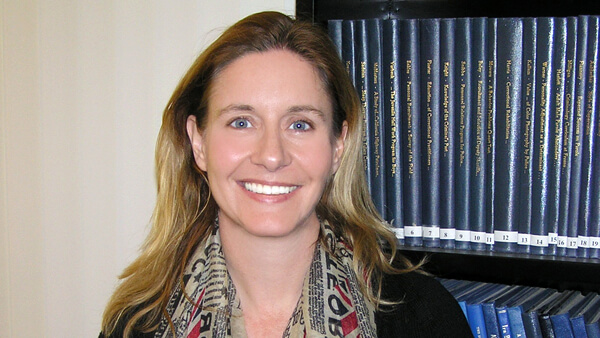Early on, Dr. Emma Hughes did not foresee a career in criminology.
An English major, she earned her bachelor’s degree from Stanford University and a master’s in history from Columbia University. She had originally intended to go to law school, but during a college internship at the Public Defender's Office in San Jose, she became more interested in the conditions in the jail and how so many of those incarcerated tended to return to a life of crime as soon as they were released.
"I was literally seeing that revolving door of justice," she said. "And I became more interested in those issues than the actual preparation of a particular criminal defense."
For a time, she worked in documentary filmmaking in New York. During the filming of homeless in Manhattan, she saw people who had former drug addictions and had lost contact with their families. It reminded her of what she had seen in the jail before, and influenced her pursuit of graduate studies in criminology.
She returned to her native England (she and her family moved to Los Angeles when she was 10 years old) and earned a master's at the University of Cambridge and a doctorate at the University of Central England, Birmingham, where she was also a full-time lecturer.
"I really became interested in criminology through my interest in prison rehabilitation programs," she said. "And also through studying why people who have been involved in a lifetime of crime change their course and move in a different direction in their lives.’
Hughes joined the Fresno State Criminology Department faculty in 2007 and now as chair tries to foster an environment that supports research, teaching and collegiality. The creation of a new forensic behavioral sciences lab is in progress, thanks to the hiring of five new assistant professors.
As a professor, she likes to impart her interest in transforming lives to her students. She's seen many formerly incarcerated people make extraordinary changes, including someone who now devotes time every semester to speak to students in her class about his personal journey and transformation from being an incarcerated drug addict to becoming a substance abuse counselor in the community.
"He's having a considerable impact on those that he is working with and helping to change their lives," she said.
Transformative impact is why Hughes was instrumental in bringing Project Rebound, developed at San Francisco State University, to Fresno State. It helps formerly incarcerated persons enroll at a university. Participants must meet all CSU requirements, but benefit from a support network. A part-time director for the program was hired last month.
"This program is designed to provide support both in dealing with what can be a very daunting application process, but also mentorship and guidance when students are here," she said. "The San Francisco State program has a very high graduation rate. It's 85 percent… and so that's what we're looking to reproduce here at Fresno State."
Hughes says education is one of the most successful and effective ways for people to turn their lives around and have a positive reentry experience back into the community. Project Rebound receives strong support from local criminal justice agencies that recognize the benefits of such a program.
Hughes has seen the transformative power of education many times. Last summer, she traveled to Uganda, Africa, through the Prison Education Project, a program that allows volunteers to teach courses at a maximum-security prison in order to provide more educational opportunities to people in correctional facilities. She was at Luzira Prison, where she taught a course in the men's prison on the history of incarceration and correctional policy in the West for two weeks, as well as a related course in the women's prison.
On one of the Saturdays that she was there, the prisoners were having a soccer tournament. During the final match of the league, the volunteers (who had very little experience playing soccer) were invited to participate in a friendly match against one of the prison teams, and Hughes' team actually won 2-1.
"They went a little easy on us, perhaps," she laughed. "I scored the first goal, which was definitely beginner's luck, but made my day."
When she returned to class on Monday, the students congratulated her.
"It contributed to the sense of breaking down barriers between the insiders and the outsiders," she said.
Her current research looks at the role of volunteers who go into prisons and jails, offering all kinds of programs — educational, faith-based, self-help, art, a full array of activities. She looks at what a difference it makes both to the incarcerated individuals, who feel valued and affirmed, and the volunteers, who feel a sense of joy and purpose.
"It is rewarding all around," she said. "I certainly had that experience going to Kampala. I learned so much."
Hughes loves to travel; she has visited Rwanda, Beijing, Hong Kong, and is planning an upcoming one to Iceland. In Fresno, she and her friends from campus enjoy ArtHop and other cultural and musical events.
"One of the things I have enjoyed about being in Fresno, and particularly through being at Fresno State, is the international community of friends that I have met here," she said. "I have friends from all over the world."
|


